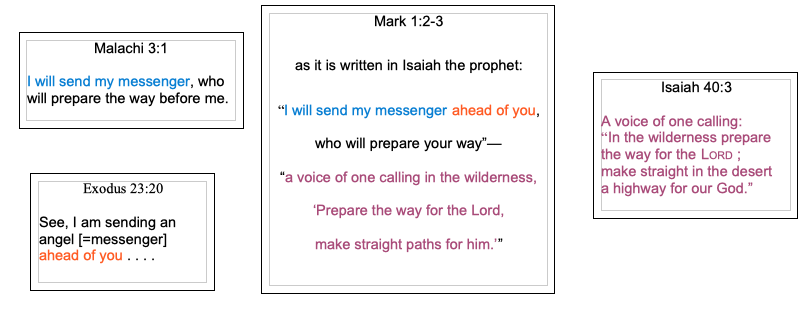Previous posts reviewing NV’s Writing With Scripture:
- How and Why the Gospel of Mark Used Scripture — a review of Writing with Scripture, part 1
- Creating New Stories from Scripture — a review of Writing with Scripture, part 2
- To What Shall We Compare the Gospels? — a review of Writing with Scripture, part 3
- Creating Pseudo-History (and Comedy) from Scripture — a review of Writing with Scripture, part 4
Don’t look too hard to try to uncover hidden meanings in scriptural allusions in the Gospel of Mark. Those scriptural allusions may be “nothing more than” fillers to flesh out colourful story details. That’s the opening message of Nathanael Vette (NV) in his third and main chapter discussing five episodes in the Gospel of Mark.
The evangelist sometimes introduces Scripture explicitly to give readers a particular interpretation; other times Scripture is woven into the narrative more subtly. There is no consistent method in the use of Scripture.
The introductory message
Take the opening verses of the Gospel. It is not an exact quotation from any passage in the Old Testament.
To the contrary, the prologue shows an author primarily concerned with the immediate demands of their narrative, untroubled by the precise wording of their sources, and creative in their application of them. Mark is nourished by the language of scripture more than the substance of it. (NV, 111. My bolding in all quotations)
NV guides the reader through both the Greek and Hebrew versions of the Scriptures in order to explore not only how the author may have arrived at the purported Isaianic quotation but also how to identify the one being prophesied: Elijah or the Messiah? In Malachi’s following chapter (4:5) the prophet speaks of Elijah coming before the “Day of the Lord” while elsewhere in the Gospel of Mark we learn that John the Baptist is the “Elijah to come”, yet the “messenger” in the source texts is surely a more exalted figure than a prophet. Some readers will be surprised to see that NV concludes . . .
In the final analysis, the garbled citation of LXX Isa. 40:3 and LXX Exod. 23:20 (and possibly Mal. 3:1), which is misattributed to Isaiah, is, above all, a prophecy concerning the coming of the Lord. Any reference to Elijah, if intended, is secondary to this aim. (NV, 116)
Perhaps so. Yet do we not find other studies pointing out how the Gospel of Mark is rich in ambiguities and ironies? Might not we read here another instance of Markan ambiguity rather than feel obligated to choose one or another option?
By his appearance you will know him
Continue reading “Creating the Gospel of Mark — a review of Writing with Scripture, part 5”

